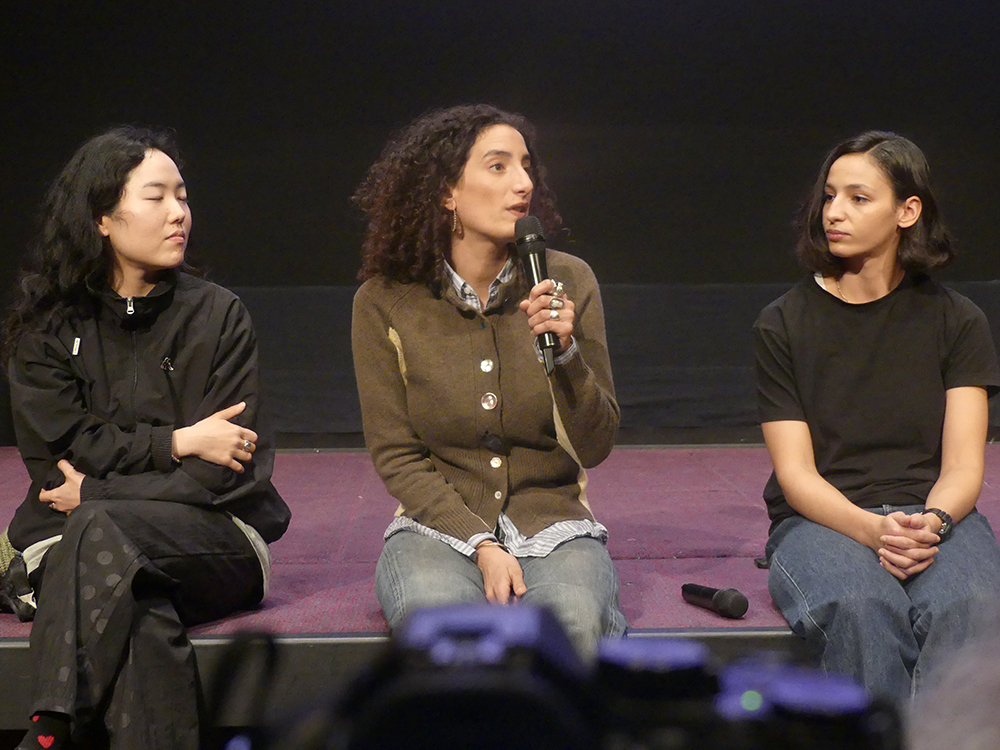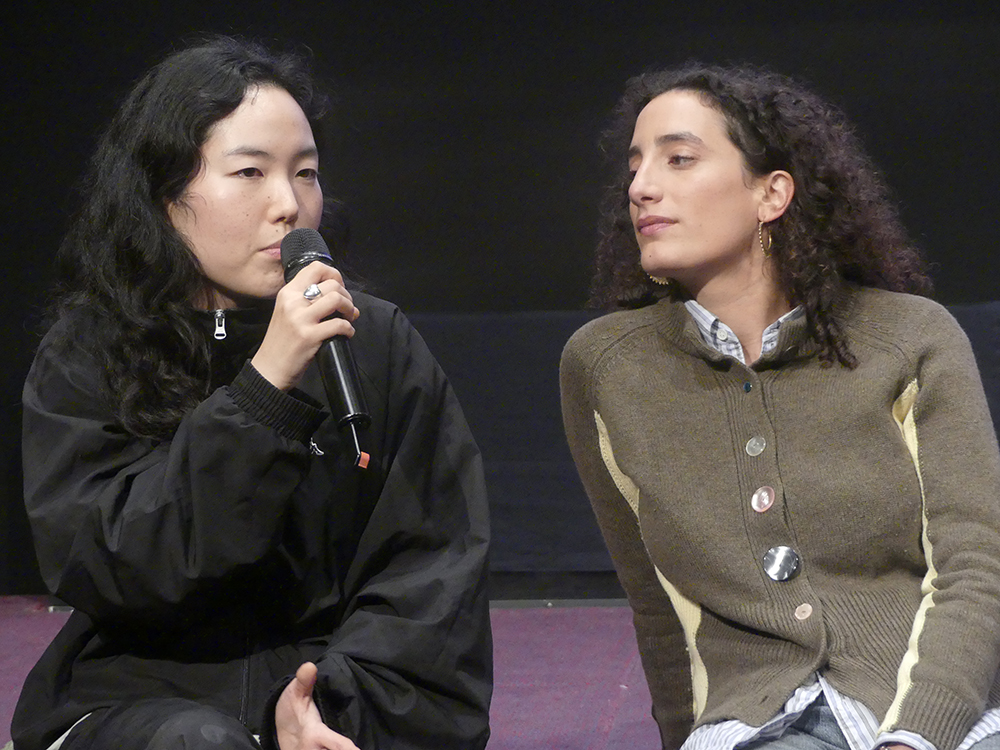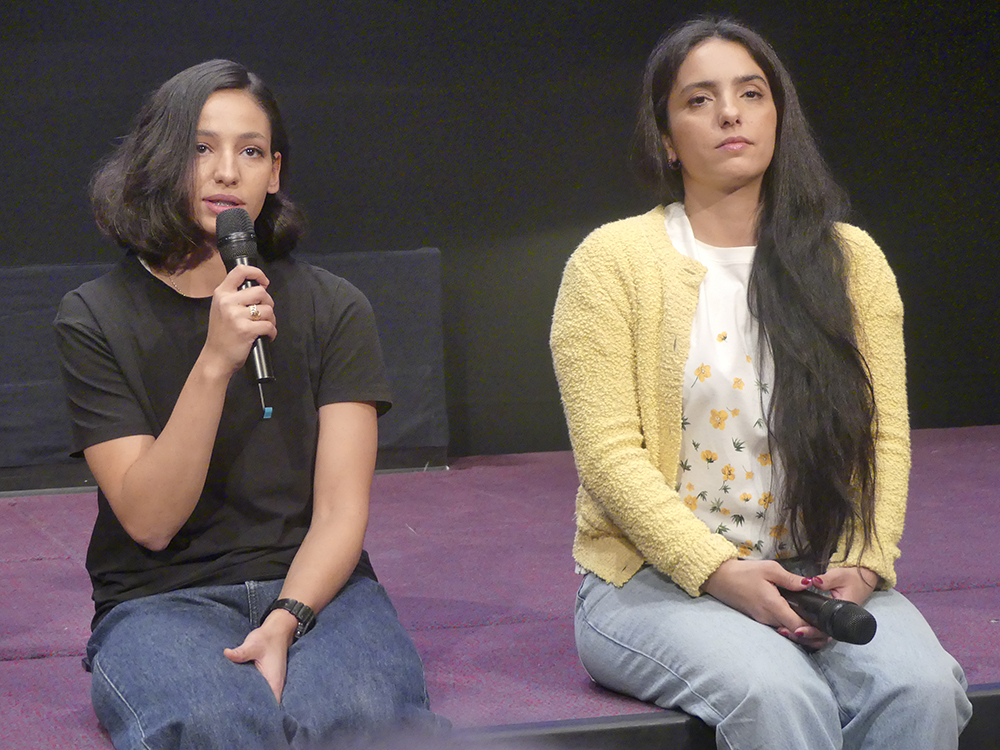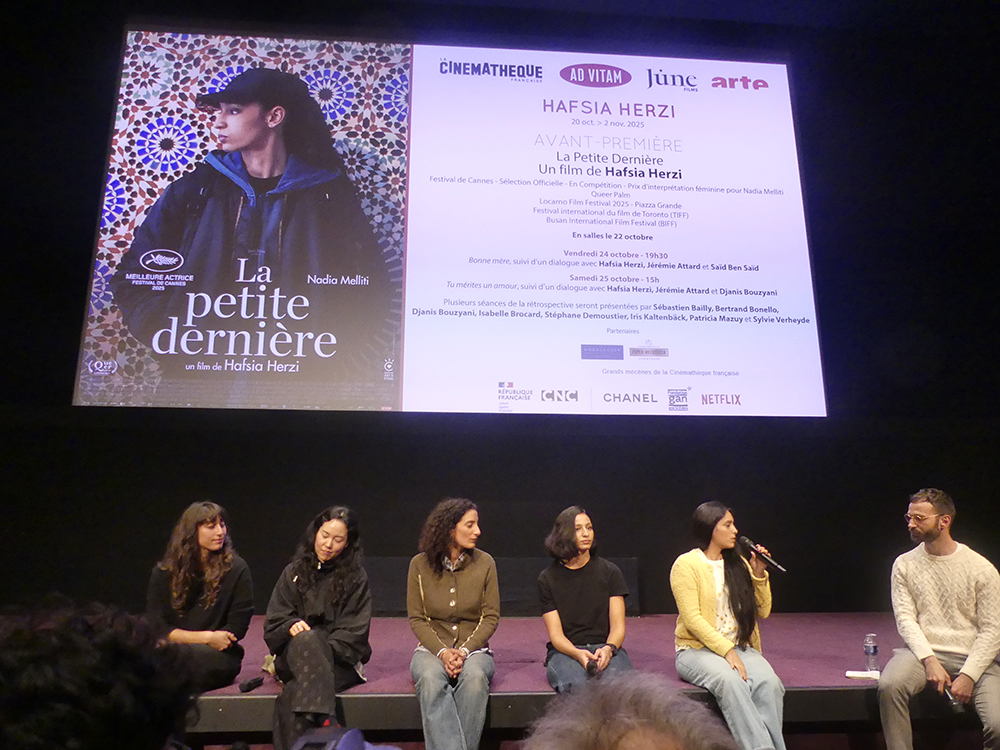Premiere - The Little Sister: an emotional and liberating preview screening at the Cinémathèque
By Mulder, Paris, La Cinematheque, 20 october 2025

There was a gentle, restrained tension in the air on Monday, October 20, 2025, at the Cinémathèque Française. Hafsia Herzi was there to present a preview of La Petite Dernière (The Little Sister), her third feature film, which has already enjoyed exceptional success since its presentation at the 2025 Cannes Film Festival, where it won the Queer Palm and the Best Actress Award for Nadia Melliti. The screening, followed by a discussion with the director and her actresses, notably Nadia Melliti, Ji-Min Park, and Amina Ben Mohamed, took on the air of a public confession, as the film, both modest and incandescent, touches on areas rarely explored in French cinema: faith, desire, family, and the quest for identity of a young woman seeking to reconcile with herself.
Adapted from Fatima Daas's autofictional novel, published in 2020 under the title The Little Sister, the film follows 17-year-old Fatima, the youngest child in a family of Algerian origin living in the Paris suburbs. A good student, curious and discreet, she enrolls in a philosophy program in Paris and discovers a new world where everything seems possible—except perhaps being fully herself. Between her Muslim faith, her upbringing, and her budding desires for women, she finds herself torn between what she believes she should be and what she is becoming. Played by Nadia Melliti, Fatima appears as a character of rare authenticity, both strong and fragile, torn but luminous. At her side, Park Ji-min, who made her breakthrough in Davy Chou's Back to Seoul, plays Ji-Na, the young woman with whom Fatima falls in love, with an intensity and gentleness that give their relationship a striking emotional power.

Hafsia Herzi, after Tu Mérites un Amour and Bonne Mère, delivers her most accomplished and intimate work to date. Her direction favors closeness and sincerity of gaze. Jérémie Attard's camera, often carried on the shoulder, captures simple gestures, silences, breaths, and glances. The first scene—ablutions, prayer—sets the tone: faith is not an obstacle here, but an anchor. The director films spirituality as a space of peace, not constraint. “It's her daily life, it's what shapes her, it's what makes her free,” explained Hafsia Herzi after the screening. With this opening gesture, the film chooses intimacy as its political terrain.
The adaptation, which she wrote herself based on Fatima Daas's novel, was intended to be free but respectful. “I wanted to keep its soul,” she confides in the press kit. Fatima Daas was consulted throughout the process, reading successive versions of the script and participating in casting choices. Hafsia Herzi drew on testimonials, encounters, and evenings spent in lesbian bars to understand, without fetishizing, the reality she wanted to portray. This immersive work gives the film a rare authenticity: every scene rings true, every glance carries weight. The choice to shoot with several non-professional actors, the direction of actors based on trust and repetition, the reduction of the technical team on set: everything aims to recreate the truth of everyday life, to erase the distance between camera and reality.

The role of Fatima was given to Nadia Melliti, a discovery that the director describes as “artistic love at first sight.” Despite her lack of experience, the actress imposes herself with instinctive force and an immediate understanding of her character. Her performance, which won an award at Cannes, literally inhabits the film. Through her, Fatima becomes the mirror of a generation seeking a balance between family loyalty and individual freedom. Opposite her, Park Ji-min provides a luminous counterpoint, a breath of fresh air, an opening to the world. Their immediate chemistry on screen transcends words.
Visually, The Little Sister follows the seasons to accompany Fatima's inner journey. Hafsia Herzi chose to shoot in two stages—winter and spring—so that time, light, and nature could participate in the narrative. Diéné Bérété's sets and Caroline Spieth's costumes meticulously recreate the family's domestic life, between warmth and promiscuity, love and suffocation. The mother, a central figure, actually cooks during the scenes—a detail that the filmmaker claims as a symbol of truth. Géraldine Mangenot's precise editing and Amine Bouhafa's subtle music, inspired by a childhood music box, prolong the discreet and continuous emotion that runs through the film.

But The Little Sister is also, deeply, an act of courage. The project encountered resistance, particularly during casting, with some refusing to participate in a film dealing with homosexuality in a Muslim context. Far from being discouraged, Hafsia Herzi saw this as another reason to see the project through to completion. “I knew it was necessary,” she says. The film does not seek to provoke, but to repair. It does not judge, it enlightens. It does not make demands, it listens. It shows a young woman who simply wants to exist “equal among equals,” to quote Étienne de La Boétie, whom Hafsia Herzi cites to define her intention.
Produced by Julie Billy and Naomi Denamur for June Films, in co-production with Vanessa Ciszewski (Katuh Studio), Arte France Cinéma, and ZDF/Arte, The Little Sister stands out as a work that is at once intimate and universal, political and poetic. Its accuracy comes from its modesty, its power from its sincerity. It is a film that is not to be viewed from above but up close, at eye level, at heart level.

At the end of the screening at the Cinémathèque, after a few seconds of silence, the audience rose to their feet. Applause filled the room, not to salute a simple film, but to thank a gesture—that of a director who dares to speak of love and faith with truth and gentleness. The Little Sister, which will be released in theaters on October 22, 2025, distributed by Ad Vitam, is an invitation to rethink what it means to be oneself, to love without denying oneself, to believe without fading away. A luminous, necessary, and deeply human film.
You can discover our photos in our Flickr page
Synopsis:
Fatima, 17, is The Little Sister. She lives in the suburbs with her sisters, in a happy and loving family. A good student, she enrolls in a philosophy program at a Paris university and discovers a whole new world. As she begins her life as a young woman, she breaks free from her family and traditions. Fatima then begins to question her identity. How can she reconcile her faith with her emerging desires?
The Little Sister
Written and directed by Hafsia Herzi
Based on The Last One by Fatima Daas
Produced by Julie Billy, Naomi Denamur
Starring Nadia Melliti, Park Ji-min, Amina Ben Mohamed, Rita Benmannana, Melissa Guers
Director of photography: Jérémie Attard
Editing: Géraldine Mangenot
Music: Amine Bouhafa
Production companies: June Films, Katuh Studio, Arte France Cinéma, ZDF/ARTE, MK Productions, MK2 Films
Distribution: Ad Vitam (France)
Release dates: May 16, 2025 (Cannes), October 22, 2025 (France)
Running time: 106 minutes
Photos and 4K video: Boris Colletier / Mulderville

